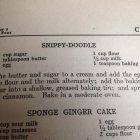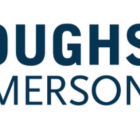Raising ’em right: Fiction & Parenthood
Within the next few weeks, I’ll be officially responsible for introducing another human being to a sense of ethics—of how to be in this world. Granted, she and I will be initially concerned with a few other things, but the time will come when we will talk about right and wrong, justice and injustice. And I’m not exactly sure how one does that well.

In addition to the many books already on this yet-to-be-born freedom fighter’s bookshelf, I recently stuck in one from a century ago—The Goody-Naughty Book. This 1913 collection of morality stories for kids arrived on my porch one spring afternoon, just as the weeds that I could no longer bend down to pluck started crowding the sidewalk. The symbolism was not lost on me.
And so I read, just like the instructions on the inside of the book suggested. (These were something along the lines of this book doesn’t end! ever! flip it over to read another set of stories.)
From the Naughty Side
In “Molly and the Pouts,” the Pouts are elves taking over a sulky little girl’s once-beautiful face. All of poor Molly’s toys (and eventually the furniture!) begin to rebel against her unpleasantness. Just as a full-on rebellion is beginning, everything changes and Molly looks around a room where everything in its place and the Pouts are nowhere to be found. She, however, learns a valuable lesson about apperances. Similarly, in the last story (and most jarring for me), young Jean forgets to feed her beautiful yellow canary, who subsequently dies. As a result, her forgetful habits are changed forever.
All of the naughties in this book have a chance at righting their wrong behavior, or at least taking to heart a good lesson. There is something quite satisfying at being able to point to a specific behavior and say: See that right there? That’s bad. So much of life is far more complicated.
“Billy Boy had a magic key. He carried it in his face.” You can probably guess the direction this story went—a quick lesson on the power of a smile. In another, a kind-hearted young boy notices a playmate without gloves. The boy gets to work shoveling snow among other odd jobs to earn money to buy his friend a brand new pair of warm gloves. Sweet, huh?
Each of the characters in the goody section are given a choice (which helps with the tiny plots) and the rewards for their good choices are satisfying. They can see the benefits of their actions which ideally will make them easier to repeat in the future.
One hundred years haven’t changed the need to point out good and “naughty” or even some of our definitions of what, exactly, they are. But what about those situations that aren’t so easily tucked into a right or wrong corner? What about those times when you do good and it’s misrepresented, or there are no obvious rewards? Or someone does wrong and there are no consequences? How are we best prepared for these realities?
The answer, I think, has something to do with not focusing on the action itself, but on the motives of the person doing it. If I think about the quality I’d most like my daughter have in terms of morality and ethics, it’s empathy.
Empathy is, by many accounts, an important aspect to moral action. A study examining those who rescued Jews during the Holocaust found that these individuals were empathic as children—their parents taught them early on to look at things from others’ perspectives.
Fiction, it turns out, can teach us the same thing. We—writers, readers, scientists, humanity studies proponents—have long wanted to put our finger on what literature does to us and why it’s valuable. Debates pop up about where we should invest our money (humanities! humanities!). There are late night conversations in dark bars during MFA programs. There are conversations in faculty lounges at high schools and universities.
In life there are questions, always questions. And the real answer—whether backed by scientific evidence or not—can be found in what we’ve been doing for years since before printing presses, when oral tradition was used to convey history, morality and meaning. We tell, and return, to stories.
While we’re reading (or listening)—to a story in any form—we are being shaped by someone else’s perspective, learning from someone else’s point of view. However subtly, we are learning how to see life through another’s eyes.
The empathy relationship has been studied before, and new research out of Canada now suggests that readers of fiction may also be more comfortable with ambiguity than nonreaders—that whole gray area in life that forces us to consider a variety of perspectives we might not otherwise have engaged:
“A trio of University of Toronto scholars, led by psychologist Maja Djikic, reports that people who have just read a short story have less need for what psychologists call “cognitive closure.” Compared with peers who have just read an essay, they expressed more comfort with disorder and uncertainty—attitudes that allow for both sophisticated thinking and greater creativity.
“Exposure to literature,” the researchers write in the Creativity Research Journal, “may offer a (way for people) to become more likely to open their minds.”
For those of us older slogs who need a little bit of help escaping our well-worn grooves, this is good news. And for a brain that’s just starting to gain shape? Well, I think I’ll leave The Goody-Naughty Book on the bookshelf, and instead start reading my daughter War and Peace during her late night feedings.




